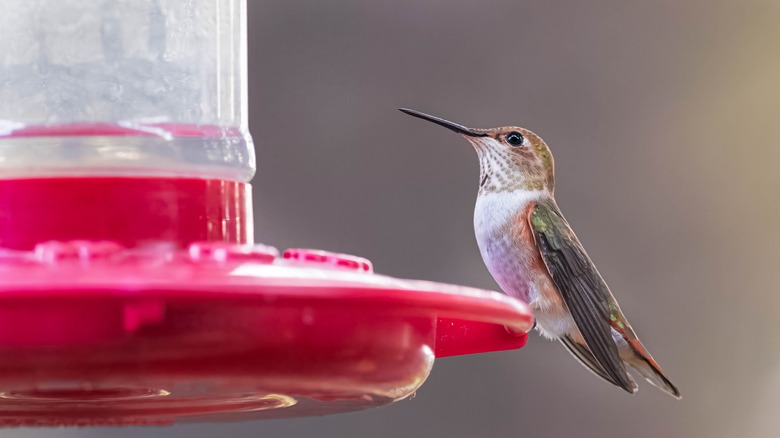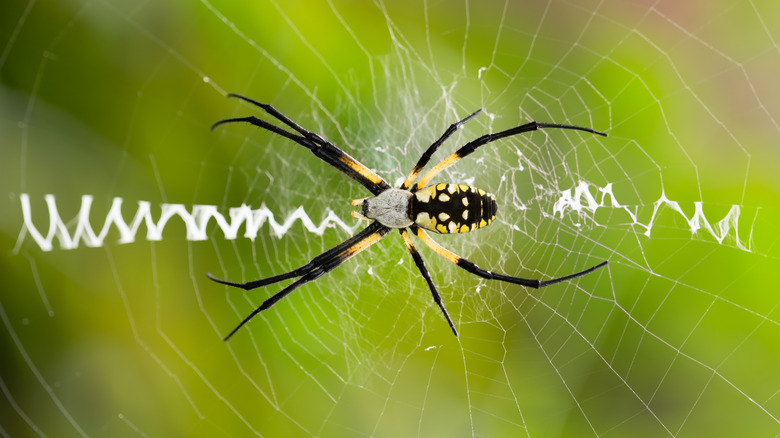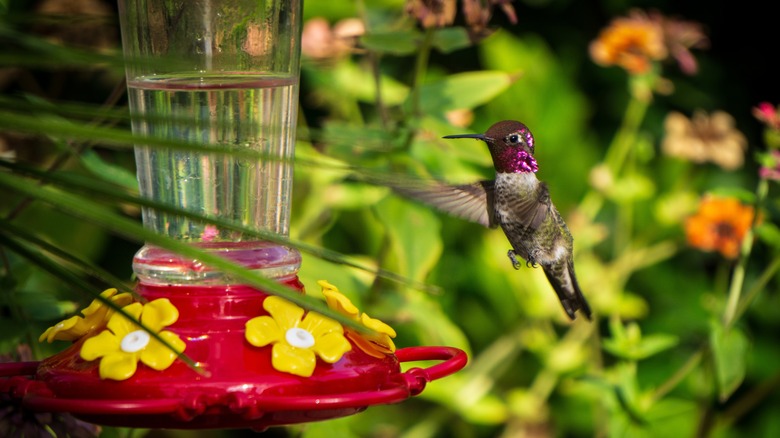The Spiders You Should Keep Far Away From Hummingbird Feeders
Hummingbirds eat a lot throughout the day to help sustain their fast metabolisms. While food sources include nectar from hummingbird feeders and a variety of flowers, these tiny birds also need protein via insects. This is even more important during nesting season, when, some scientists predict, insects make up about half of the hummingbird diet. Spiders aren't necessarily on this list, though hummingbirds have been known to eat smaller spiders on occasion. They also use spider webs along with plant materials and lichen to help build nests.
Though it might seem like the relationship between spiders and hummingbirds is pretty one-way, our eight-legged friends can also be dangerous for hummingbirds. This is mostly due to orb-weavers, which spin large spider webs that the lightweight birds may accidentally fly into. For these reasons, even if you have found the best spot in your garden to hang your hummingbird feeder, it's important to monitor the area carefully to make sure your hummingbird friends don't accidentally fly into a spider web while feeding on nectar.
Certain spiders can be dangerous for hummingbirds
Despite their uses for spiders and their webs, hummingbirds don't always benefit from spiders. In particular, orb-weaving spiders pose the most danger, due to their large, wheel-shaped webs that can trap almost anything that mistakenly flies into them. Common U.S. spiders like the golden orb weaver, yellow orb weaver, or the newly invasive Joro spider spin webs large and strong enough to potentially capture hummingbirds. As to the question of whether spiders actively prey on hummingbirds, it seems that most cases of web entrapment are accidental, though this can vary by species of spider. For example, larger South American spiders may eat these small birds, but in North America, you have more to worry about from predators like bullfrogs or hawks than you do from arachnids.
While it may be tempting to get rid of every spider web anywhere near your property for the sake of protecting hummingbirds, this is not necessary. Furthermore, getting rid of all spiders could inadvertently harm these birds, particularly the small varieties they might eat and the webs they use for nests.
How to keep hummingbirds safe around their feeders
The key to maintaining hummingbird safety along with potential food and nesting sources is balance. You should remove any spider web from hummingbird feeders, including those built directly on our nearby the feeder. This reduces the risk of the birds getting accidentally trapped after flying into webs during feedings. Also, if you spot a potential species of spider that could prey on hummingbirds, you could consider getting rid of their webs. Instead of scorched-earth destroying all webs you encounter, it's best to learn what orb weaver webs look like and whether any live in your garden and proceeding from there to make sure your feeders are safe.
If you spot a hummingbird caught in a web, Douglas Everett's Hummingbird Market recommends using a cloth or hand towel to gently get it loose. From there, place the bird in a small box to keep it safe while you reach out to a wildlife rehabilitation expert, animal rescue, or veterinarian for advice. It's illegal to keep hummingbirds as pets, so your time to care for it and release it is limited.
Aside from spiders and their webs, there are a few other predators to be on the lookout around hummingbird feeding spots. Seeing a praying mantis on your hummingbird feeder is cause for concern, as well as dragonflies — the common green darner has been observed eating hummingbirds. Cats can hunt these small birds, too, so keep an eye on your feline if it's hummingbird season.


